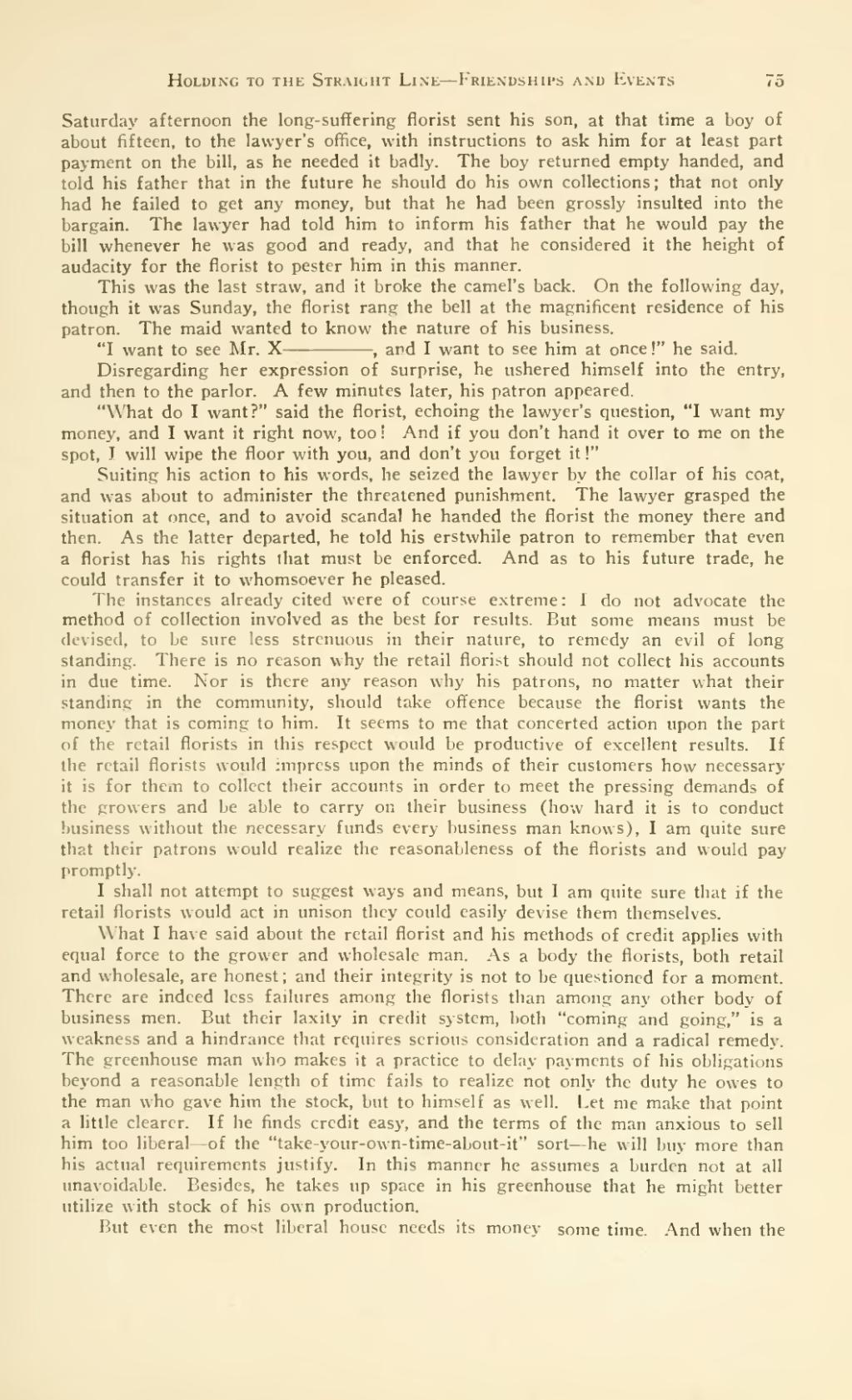Saturday afternoon the long-suffering florist sent his son, at that time a boy of about fifteen, to the lawyer's office, with instructions to ask him for at least part payment on the bill, as he needed it badly. The boy returned empty handed, and told his father that in the future he should do his own collections; that not only had he failed to get any money, but that he had been grossly insulted into the bargain. The lawyer had told him to inform his father that he would pay the bill whenever he was good and ready, and that he considered it the height of audacity for the florist to pester him in this manner.
This was the last straw, and it broke the camel's back. On the following day, though it was Sunday, the florist rang the bell at the magnificent residence of his patron. The maid wanted to know the nature of his business.
"I want to see Mr. X, and I want to see him at once!" he said.
Disregarding her expression of surprise, he ushered himself into the entry, and then to the parlor. A few minutes later, his patron appeared.
"What do I want?" said the florist, echoing the lawyer's question, "I want my money, and I want it right now, too! And if you don't hand it over to me on the spot, I will wipe the floor with you, and don't you forget it!"
Suiting his action to his words, he seized the lawyer by the collar of his coat, and was about to administer the threatened punishment. The lawyer grasped the situation at once, and to avoid scandal he handed the florist the money there and then. As the latter departed, he told his erstwhile patron to remember that even a florist has his rights that must be enforced. And as to his future trade, he could transfer it to whomsoever he pleased.
The instances already cited were of course extreme: I do not advocate the method of collection involved as the best for results. But some means must be devised, to be sure less strenuous in their nature, to remedy an evil of long standing. There is no reason why the retail florist should not collect his accounts in due time. Nor is there any reason why his patrons, no matter what their standing in the community, should take offence because the florist wants the money that is coming to him. It seems to me that concerted action upon the part of the retail florists in this respect would be productive of excellent results. If the retail florists would impress upon the minds of their customers how necessary it is for them to collect their accounts in order to meet the pressing demands of the growers and be able to carry on their business (how hard it is to conduct business without the necessary funds every business man knows), I am quite sure that their patrons would realize the reasonableness of the florists and would pay promptly.
I shall not attempt to suggest ways and means, but I am quite sure that if the retail florists would act in unison they could easily devise them themselves.
What I have said about the retail florist and his methods of credit applies with equal force to the grower and wholesale man. As a body the florists, both retail and wholesale, are honest; and their integrity is not to be questioned for a moment. There are indeed less failures among the florists than among any other body of business men. But their laxity in credit system, both "coming and going," is a weakness and a hindrance that requires serious consideration and a radical remedy. The greenhouse man who makes it a practice to delay payments of his obligations beyond a reasonable length of time fails to realize not only the duty he owes to the man who gave him the stock, but to himself as well. Let me make that point a little clearer. If he finds credit easy, and the terms of the man anxious to sell him too liberal—of the "take-your-own-time-about-it" sort—he will buy more than his actual requirements justify. In this manner he assumes a burden not at all unavoidable. Besides, he takes up space in his greenhouse that he might better utilize with stock of his own production.
But even the most liberal house needs its money some time. And when the
